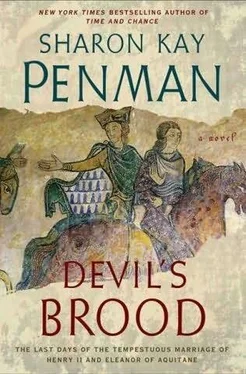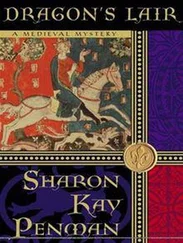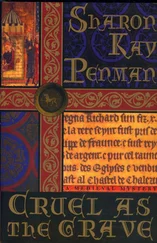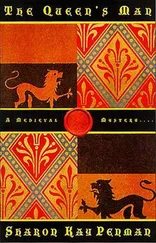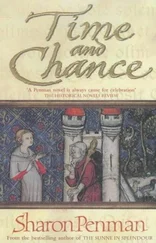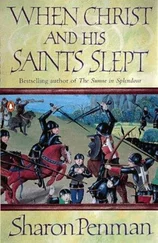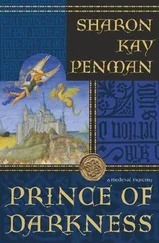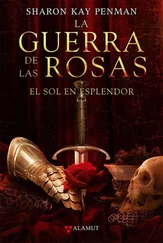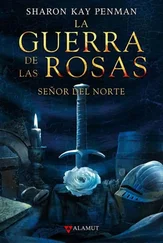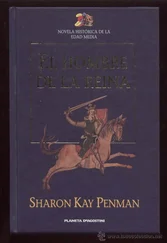Sharon Penman - Devil's brood
Здесь есть возможность читать онлайн «Sharon Penman - Devil's brood» весь текст электронной книги совершенно бесплатно (целиком полную версию без сокращений). В некоторых случаях можно слушать аудио, скачать через торрент в формате fb2 и присутствует краткое содержание. Жанр: Исторические приключения, на английском языке. Описание произведения, (предисловие) а так же отзывы посетителей доступны на портале библиотеки ЛибКат.
- Название:Devil's brood
- Автор:
- Жанр:
- Год:неизвестен
- ISBN:нет данных
- Рейтинг книги:4 / 5. Голосов: 1
-
Избранное:Добавить в избранное
- Отзывы:
-
Ваша оценка:
- 80
- 1
- 2
- 3
- 4
- 5
Devil's brood: краткое содержание, описание и аннотация
Предлагаем к чтению аннотацию, описание, краткое содержание или предисловие (зависит от того, что написал сам автор книги «Devil's brood»). Если вы не нашли необходимую информацию о книге — напишите в комментариях, мы постараемся отыскать её.
Devil's brood — читать онлайн бесплатно полную книгу (весь текст) целиком
Ниже представлен текст книги, разбитый по страницам. Система сохранения места последней прочитанной страницы, позволяет с удобством читать онлайн бесплатно книгу «Devil's brood», без необходимости каждый раз заново искать на чём Вы остановились. Поставьте закладку, и сможете в любой момент перейти на страницу, на которой закончили чтение.
Интервал:
Закладка:
All that had changed, of course, as he bled to death on the floor of his own cathedral, and when the monks had discovered their slain archbishop’s vermin-infested hair-shirt under his blood-soaked garments, none had doubted they were in the presence of sainthood. Acclaimed as a holy martyr in death, even by those who’d considered him to be a vexation and an enigma in life, Thomas Becket was sure to be anointed as the Church’s next saint. Already people flocked to his tomb at Canterbury, seeking healing cures and buying little vials of his blood as precious relics. More than fifteen months after Becket’s death, Ranulf still marveled at it all. Was Becket truly a saint?
He smiled wryly, then, remembering his last meeting with his nephew the king, just before Henry’s departure for Ireland. Over a late-night flagon of wine, Henry had challenged him, wanting to know if he believed Becket was a saint. He still recalled his reply. “I cannot answer your question, Harry, doubt that anyone can. I do know, though, that saints are not judged like ordinary men. That is, after all, what makes them saints.” Henry had reflected upon that in silence, then said, sounding both skeptical and regretful, “Saint or not, Thomas got the last word for certes.”
Menevia was the name given to the small settlement that had sprung up around the cathedral of St David. Its houses were outnumbered by shabby inns, stables, taverns, and a few cook-shops, for the shrine of the Welsh saint was a popular choice for pilgrimages. Because of its remoteness and the difficulty of travel in Wales, the Holy See had decreed that two pilgrimages to St David’s were the equivalent of one to St Peter’s in Rome. The cathedral itself was situated just west of the village in a secluded hollow, out of sight of the sea raiders and Norsemen who had pillaged the coast in bygone times.
The men expected to be accosted by villagers proclaiming the comforts of their inns, the superiority of their wines and mead, the bargain prices of their pilgrim badges. To their surprise, the streets appeared deserted. Advancing uneasily, they finally encountered an elderly man in a doorway, leaning heavily upon a wooden crutch.
“Where have all the folk gone?” Rainald called out, and when he got only a blank stare in response, Ranulf repeated the question in Welsh, to better effect.
“To the harbor,” the ancient replied, hobbling forward a few steps. “Sails were spied and when word spread, people went to see. Most pilgrims come on foot, but we do get some who sail from Normandy and Flanders, even a few Frenchmen who lack the ballocks to brave Welsh roads.” He grinned, showing a surprising mouthful of teeth for one so old, but Ranulf knew the Welsh were particular about tooth care, cleaning them with green hazel shoots and polishing them with woolen cloth.
Flipping him a coin for his trouble, Ranulf interpreted for the others, translating the old man’s “Frenchmen” into “English” to avoid confusion. It was not always easy to live in lands with so many spoken tongues. To many of the Welsh, the invaders from England were French, for that was the language they spoke. To the French, those who dwelled on the rain-swept island were English. But those descendants of the men who’d followed William the Bastard to victory in God’s Year 1066 thought of themselves as Norman, and his nephew Henry was Angevin to the core.
Having no interest in incoming ships, they continued on toward the cathedral, where they received the welcome worthy of an earl, although Gerald de Barri was disappointed to learn that the bishop, his uncle, was away. They were escorted to the guest hall and were washing off the grime of the road when they heard shouting out in the close. Ranulf and Rainald hastened to the window, looking down at a man sprinting toward the bishop’s palace. As several canons hurried to meet him, he sank to his knees, chest heaving.
“The king…” He gasped, struggling for breath. “The king is coming! His ships have dropped anchor in the harbor!”
By the time their party reached the beach, Henry and his companions had come ashore and were surrounded by a large crowd: villagers, pilgrims, and the local Welsh. It always amazed Ranulf to watch his nephew with his subjects, for he had not enough patience to fill a thimble and yet he showed remarkable forbearance when mobbed by supplicants, even those of low-birth. Ranulf had seen many people undone by the lure of power, so many that he’d long ago concluded it was a sickness in and of itself, one as dangerous in its way as the spotted pox or consumption. Harry, he thought, had come the closest to the mastery of it…so far.
“Your Grace!” Rainald bellowed, loudly enough to hurt nearby eardrums. Henry turned toward the sound, for at thirty-nine, he still had the keen hearing of a fox. He beckoned them forward and they made the public obeisance due his rank and then were enfolded into welcoming embraces, for Henry had never been one for ceremony.
Henry showed no surprise at their appearance upon this remote, rocky shore. “My fleet anchored safely at Pembroke,” he said with satisfaction. “But how did you guess that I’d be landing at St David’s?”
Rainald looked puzzled, but Ranulf joked, “All know I have second sight,” before admitting that they’d not passed through Pembroke, knew nothing of the landing of the king’s fleet, and their meeting upon this westernmost tip of Wales was pure happenchance.
“Well, it is an auspicious omen, nonetheless,” Henry declared, “getting my homecoming off to a good start.” Several canons from the cathedral had arrived by now and Henry allowed them to lead the way from the beach, explaining piously that he’d sent his fleet on ahead yesterday, but had refrained from traveling himself on the holy day of the Lord Christ’s Resurrection. The canons murmured approvingly at such proof of their sovereign’s reverence. Ranulf and Rainald, who knew their nephew far better than these credulous clerics, exchanged amused grins. Henry’s campaign to placate the Church had already begun.
St David’s was only a mile distant, but their progress was slow because of the crowds pressing in upon them. Henry did not seem to mind; leaning upon a pilgrim’s staff, he turned their trek into a procession, good-naturedly acknowledging the greetings of the villagers, even bantering with a few of the bolder ones. But the friendly, relaxed atmosphere changed abruptly when they reached the cathedral close.
More of the canons were clustered at the gate, making ready to welcome the king. A muddy stream grandiosely known as the River Alun bordered the northern side of the churchyard, bridged by a large marble stone, its surface polished and worn by the tread of countless pilgrim feet. As Henry approached, an elderly woman stepped forward and cried out in a hoarse, strident voice.
Henry had a good ear for languages, but Welsh had always eluded him, and he turned to the canons for enlightenment. Obviously flustered, they sought to ignore the woman’s ranting, insisting she was babbling nonsense and not to be heeded. Henry knew better; one glance at the spectators told him that. Some looked horrified, others embarrassed, and a few-those with the dark coloring of the Welsh-eagerly expectant.
“What did she say, Ranulf?” he demanded of the one man he could trust to give him an honest answer.
Ranulf answered reluctantly, yet truthfully. “She called upon Lechlaver to revenge the Welsh upon you.”
Henry scowled. “Who the Devil is Lechlaver? Some heathen Welsh god?”
“No…it is the name of yonder rock.” Realizing how bizarre that sounded, Ranulf had no choice but to tell Henry the rest. “Local legend has it that Merlin made a prophecy about Lechlaver. He foretold that a ruddy-faced English king, the conqueror of Ireland, would die upon that rock.”
Читать дальшеИнтервал:
Закладка:
Похожие книги на «Devil's brood»
Представляем Вашему вниманию похожие книги на «Devil's brood» списком для выбора. Мы отобрали схожую по названию и смыслу литературу в надежде предоставить читателям больше вариантов отыскать новые, интересные, ещё непрочитанные произведения.
Обсуждение, отзывы о книге «Devil's brood» и просто собственные мнения читателей. Оставьте ваши комментарии, напишите, что Вы думаете о произведении, его смысле или главных героях. Укажите что конкретно понравилось, а что нет, и почему Вы так считаете.
